Foundation for Rural & Regional Renewal (FRRR)
Four rural health services in NSW and VIC awarded grants
The Foundation for Rural & Regional Renewal (FRRR) has awarded $368,768 in grants to four community health organisations in rural, regional and remote New South Wales and Victoria to enhance the primary and preventative health service offering in their communities.
Funded through the Enhancing Country Health Outcomes (ECHO) program, these grants will help to fill identified gaps in rural health workforce support and development, and the provision of accessible health care in areas where services are limited. Regions that are benefiting from these grants include the smaller communities surrounding the service centres of Nowra, Wagga Wagga, Armidale and Dubbo in NSW and Kerang, Wedderburn and Harrow in Victoria.
Natalie Egleton, CEO of FRRR, said that the ECHO program has provided insights into the various challenges facing health services in rural communities, and the continuing inequity of service access and provision.
“There’s a real need for flexible funding of community-based primary and preventative health services in rural communities, so it’s fantastic to be able to support local health initiatives through the ECHO program and help fill some of these gaps. Projects like Northern District Community Health’s place-based Rural Health Matters initiative will address health needs, health inequities and service provision gaps across several rural Victorian communities,” Ms Egleton said.
“There are also significant workforce shortages and limited access to upskilling and professional development opportunities for rural health services. We are pleased to be able to support the Cerebral Palsy Alliance in NSW and Harrow Bush Nursing Centre in Victoria. With these grants, these organisations can now undertake staff training and improve professional development opportunities throughout a number of rural communities.
“We are also pleased support an initiative lead by the Services for Australian Rural & Remote Allied Health, which will work with selected rural communities in both NSW and Victoria, helping communities to build their own capacity to attract and support a long-term rural workforce in their regions.
“This is the final round of the ECHO program, which was created thanks to a donation of just over $900,000 from Beyond Medical Education when they wound up. The program has highlighted the need for philanthropic support to help these local health services overcome health inequity in rural, regional and remote communities and we hope we can continue to help to fill these gaps,” Ms Egleton said.
Lynda Vamvoukis, former CEO of Beyond Medical Education, said that it is inspiring to see how Beyond Medical Education’s remaining funds have been used by groups to improve the local primary health care needs of the community.
“Building strong and sustainable relationships that support the health of these communities is critical. It has been rewarding to see this program support projects that foster this kind of long-term, health care provider collaboration,” said Ms Vamvoukis.
The four projects awarded grants this final round of the ECHO program are:
- Cerebral Palsy Alliance – Armidale, Dubbo, Nowra, Wagga Wagga, NSW – $80,000 – Improve access to, and delivery of services to people with a disability in rural communities by providing essential equipment, resources and training for rural therapists.
- Services for Australian Rural and Remote Allied Health – NSW and VIC – $140,179 – Address persistent rural workforce shortages in small rural and remote towns in NSW and Victoria through an Attract, Connect, Stay project leveraging Rural Health Workforce Coordinators.
- Harrow Bush Nursing Centre – Harrow, VIC – $33,589 – Increase organisational capacity and improve patient care by upskilling the existing rural workforce and upgrading the primary care vehicle to safely transport emergency equipment.
- Northern District Community Health – Kerang, Wedderburn, VIC – $115,000 – Improve the current and emerging health needs for Buloke, Loddon and Gannawarra Shire residents through the delivery of a collaborative placed-based systems approach
The Pain Revolution, in conjunction with the University of South Australia, set out to establish a community-led health initiative to promote best-practice pain management services in country NSW and Victoria, by raising awareness of pain neurobiology and the use of a bio-psycho-social pain model of education and care.
If that all sounds quite complicated, these facts are simpler to understand, though not very easy to digest:
- One in five Australians lives with chronic pain. In those over the age of 65, this increases to 1 in 3.
- According to The Pain Revolution, persistent pain is a bigger disability burden on rural Australia than cancer and diabetes combined.
- It is the most common reason for early departure from the workforce, and a known risk factor for severe depression and suicide.
What’s more, access to pain management services is poor in rural communities, and most attempts to address the problem include ‘travelling health teams’ and ‘country visits’ from city health specialists. With GPs reporting that they have insufficient knowledge, skill and self-efficacy to deliver best practice for persistent pain patients, The Pain Revolution stepped in to design a sustainable program of training, mentoring and resourcing with a focus on local capacity building.
Founded in 2017, The Pain Revolution is a cross sector collaboration led by Professor Lorimer Moseley from within the School of Health Science at the University of South Australia. It also draws on expertise from others working in the field, holding strong partnerships with the National Rural Health Alliance, Pain Australia, Australian Pain Society, the Australian Physiotherapy Association and the Australian College of Sports & Exercise Physicians. Their collective aim is to embed the capacity to deliver best practice pain education and care within rural and regional communities, and they are doing this through the Local Pain Collectives (LPC) program.
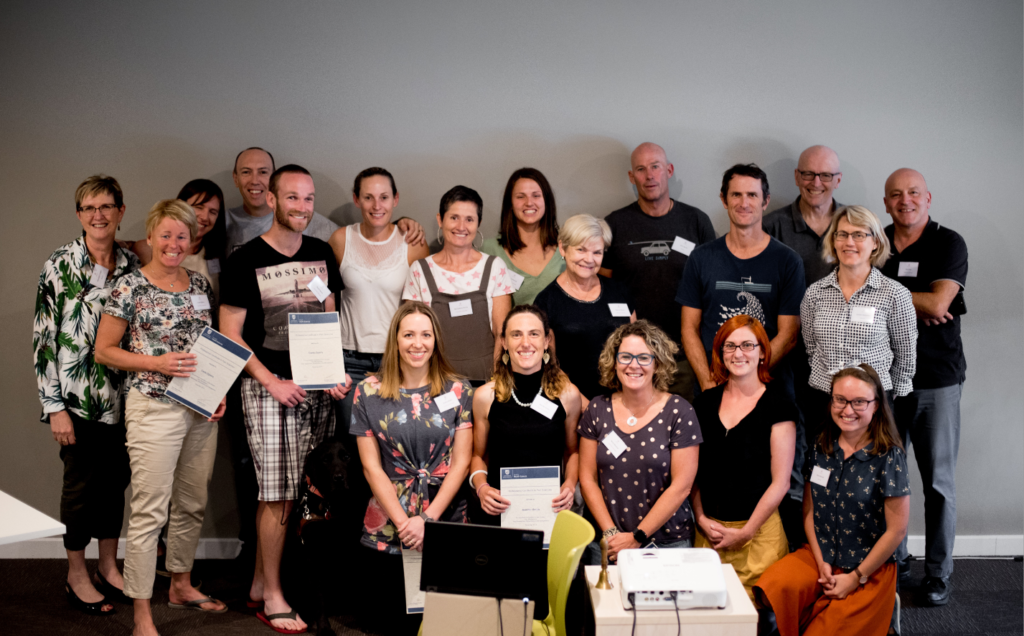
Pain science is an area with lots of interesting research and developments; new and effective approaches have been identified to prevent and manage persistent pain, placing emphasis on active approaches (movement and learning based) rather than passive ones (drugs, massage and surgery). These new self-management approaches can seem counter-intuitive amongst health professionals unless they have an understanding of contemporary pain science. International guidelines now universally recommend education as first-line treatment, but this is rarely delivered effectively as part of usual care.
The Pain Revolution determines where to target their efforts by assessing which rural and regional communities are flagged by the Australian Health Atlas as having excessive opioid prescriptions, back fusions and knee replacements. In response, the LPC program aims to upskill GPs and allied health professionals in best practise pain education and care within these communities, and establish a supported network amongst this difficult area of medical practice.
The Pain Revolution provided scholarships to twelve health professionals who live in regional communities across NSW/VIC. These individuals were trained to organise and deliver pain education events to the general public and other health professionals, and become clinical leaders and ‘champions for change’ within their community. Funding from the Enhancing Country Health Outcomes (ECHO) grant program enabled them to form a Local Pain Collective and deliver pain education in six regional areas of NSW: Wollongong, Nowra, Jindabyne, Cooma, Wagga Wagga and Albury/Wodonga.
Each Collective has delivered activities including pain education sessions, clinical support for knowledge to practice transfer, and a facilitated platform for peer-to-peer learning and resource sharing. A three-day workshop strengthened the network, bringing together the local pain educators, the reference group, content experts and facilitators, and monthly network meetings followed. The workshop also informed where skills could be developed, and this fed into the design and delivery of a monthly webinar series. Topics of direct relevance to the rural and regional context included understanding opioids, appraising evidence, facilitation skills, implementing behaviour change principles to pain care, and choosing words carefully when talking to pain patients.
In their application, Pain Revolution wrote that the project would deliver benefits on three levels. Of course it would benefit the rural and regional-based GPs and allied health professionals that participate. By improving pain education and care, it would also benefit the 1 in 5 rural Australians who suffer from persistent pain and the many more at risk of it because of a lack of up-to-date information and care.
The third level of benefit really speaks to the aims of the ECHO grant program:
“The extent to which persistent pain impacts entire communities – almost everyone is affected – means that this project will benefit entire communities by promoting informed self-management and resilience.”
FRRR is delighted to have been able to support this program, which is clearly making a difference to the lives of many rural people.
Investing in the long-term future of rural NSW communities
The Foundation for Rural & Regional Renewal (FRRR) has awarded $1,047,716 in grants to support 37 projects led by not-for-profit organisations (NFPs) across six rural communities in New South Wales, through the Investing in Rural Community Futures (IRCF) program.
The more than $1 million in grants is funded through FRRR’s partnerships with the Vincent Fairfax Family Foundation (VFFF) and The Snow Foundation, which are both committed in helping develop communities in rural and regional NSW.
IRCF is a place-based program that provides local NFPs and community sector organisations with practical support and funding so they can be stronger, more resilient, and fulfill their purpose with greater impact. The program encourages collaboration and community-led solutions that will seed the long-term self-sufficiency of these organisations.
In partnership with the Vincent Fairfax Family Foundation, FRRR launched the IRCF program in the regional NSW communities of Junee, Leeton and Nambucca Valley. Now in their second year of the five-year program, these communities are sharing a further $557,698 in Ongoing Partnership Grants.
Alli Mudford, IRCF Program Manager, said that these grants mark the start of the second phase of the IRCF program.
“The first phase was about bringing community-based organisations together to explore common needs and identify areas where they could collaborate, as well as identify what support they required as individual organisations. The kind of issues that emerged included the need for staff, organisational training and skills development, and investment in community and organisational infrastructure.
“This second phase of the program is about helping the organisations take action on these common areas of need with the support of these grants.
“For example, in Nambucca Valley, a key challenge is broad community engagement. We are supporting Nambucca Valley Youth Services and Mujaay Ganma Foundation to develop projects to help them engage more deeply with locals, particularly the young people of Nambucca Valley, by providing training and mentoring opportunities.
“In Junee and Leeton, for example, Junee Rhythm and Rail, Junee Senior Citizens and Leeton Show Society will use their funding to purchase equipment and refurbish community infrastructure that is used by a number of local not-for-profits,” said Ms Mudford.
Some of the other projects funded through these IRCF Ongoing Partnership Grants include:
- Junee Community Power received $15,000 to alleviate energy poverty for the community by installing solar power to the Junee Senior Citizens Hall. This will be the start a bigger initiative for Junee not-for-profits and community power.
- Leeton Connect received $90,000 to support Leeton not-for-profits by employing a coordinator to deliver training and development.
- Jaanymili Bawrungga in Nambucca Valley received $30,290 to develop a strategic plan to assist with operational objectives and create cultural economic sustainability with the support of a consultant.
A full list of IRCF Ongoing Partnership Grants recipients and their projects are below.
FRRR staff will continue to walk alongside these three communities, working with them to implement their community roadmap. Nambucca Valley has seen a strong demand for funding with the first tranche allocated to projects that will be managed in line with the region’s overall allocation for the life of the program. Further grants will be awarded in Leeton and Junee later in the year.
Program now rolling out on South Coast
In April 2020, FRRR and The Snow Foundation partnered with the commitment to increase their ongoing support of South Coast communities and to expand the IRCF program into Bateman’s Bay, Nowra and Ulladulla. As part of the program launch, these communities are sharing in $490,018 in Start-Up Grants.
Kate Dezarnaulds, IRCF Coordinator for Shoalhaven, said last summer’s bushfires and now COVID-19 have had a direct impact on the energy, capability, and resources of these largely volunteer-run NFPs.
“These Start-Up Grants will provide a range of dynamic grassroots organisations with funding for projects that will strengthen them and increase their capacity to support the recovery and renewal of their communities, which have been so clearly impacted by these disasters.
“For example, community organisations such as Shoalhaven Health & Arts and Milton Ulladulla Business Chamber are looking at ways to better connect with their community through improved digital infrastructure.
“Other groups, like Shoalhaven Community Preschool, Ulladulla and Districts Community Resources Centre, and the Southcoast Health and Sustainability Alliance, are using their grants to improve governance and provide tailored training and mentoring opportunities for staff and volunteers. These are the kind of projects that struggle to find funding outside of the Investing in Rural Community Futures program, but they make a real difference to the viability and resilience of the not-for-profit sector in the region,” said Ms Dezarnaulds.
Some of the other projects funded through these IRCF Start-Up Grants include:
- The Family Place in the Batemans Bay area received $40,785 to develop a 5-year strategic plan that supports the urgent need to adapt to Telehealth to continue to provide services during COVID-19.
- The Shoalhaven Women’s Resource Group in Nowra received $18,810 to work with a consultant to develop a new fundraising strategy that focuses on the launch of a social enterprise to provide a first employment opportunity for the women they support who are exiting prison.
- Treading Lightly in Ulladulla received $25,000 to establish a Community Hub to host their regular program of small-scale community building meetings, workshops and activities for the regions affiliated NFP’s – these workshops and meetings often have an environmental sustainability and youth outreach focus.
A full list of IRCF Start-Up Grants recipients and their projects are below.
Over the coming six months FRRR staff and facilitators on the ground will work closely with the three communities on the South Coast, supporting them to put their Start-Up Grants projects into action.
All 37 IRCF grantees will have until December 2021 to implement their projects.
Jump to IRCF Ongoing Partnership Grants: JUNEE | LEETON | NAMBUCCA VALLEY
Jump to IRCF Start-Up Grants: NOWRA | ULLADULLA | BATEMANS BAY
FRRR’s Not-for-Profit Fundraising Accounts help make FRRR’s unique tax status available to community organisations to assist with fundraising.
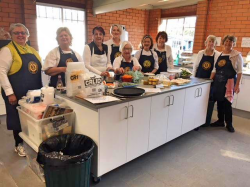
The Royal Agricultural Society of NSW (RAS) Foundation helps to build strong, vibrant and resilient rural communities through education and skills development. The Foundation operates the RAS Rural Fund, a charitable organisation that is currently fundraising via a Not-for-Profit Fundraising Account to help community organisations across rural and regional NSW refurbish and restore rural showground kitchens.
Not only is the kitchen the heart of the home, but it is also often the heart and soul of rural communities, serving as a meeting place and hub for activities. Many showground kitchens across NSW require an upgrade to provide more functional facilities to benefit their communities and better support a broad range of events and activities. The RAS NSW Showground Kitchen Upgrade Grant project will provide critical funds to improve kitchens to serve their communities better, enabling them to come together to support one another, through fundraising events and other activities.
If you want to support this initiative and make a tax-deductible donation, you can do so via FRRR’s secure website.
If you’d like to explore having a fundraising account for your community project, contact Jo Kemp, FRRR’s Philanthropic Services Manager.
The Sunset Strip Village is located on Menindee Lakes in NSW and has experienced severe drought cycles for the past seven years. Without a water supply for the Community Centre Precinct lawns, Landcare Nursery and land restoration sites, the areas turned brown and undesirable.
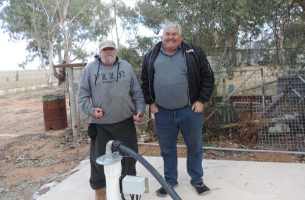
The psychological and economic impact of the long-lasting drought has led to painful shortfalls for the community, including the tragic death of a much-loved local volunteer. In addition, at least 28 families in the agricultural industry have abandoned the area, with weekend residents quick to follow suit. The result was a drying and demoralised Sunset Strip, with a third of its houses up for sale.
The Sunset Strip Progress Association Inc (SSPAI) is a locally run not-for-profit, co-managing everything from the local pub to the post office. This resilient group of volunteers have tackled drought-related challenges in the community since 2012, and they were not about to give up their sunny strip. SSPAI knew what their village needed in order to not only survive, but grow and thrive as a small rural community – and they were willing to put in the work to make it happen.
The idea was simple: make the area green and prosperity will follow. The project has well-received by the community as it they all wanted to see the Community Centre Precinct flourish, a restoration of Landcare plantations, and an increase in lifestyle, liveability and house sales with new residents.
Thanks to a $19,070 Tackling Tough Times Together grant funded by the Australian Government, the Sunset Strip Progress Association purchased a submersible pump, a 1,000-watt solar panel, a water controller, a pressure solar pump and 3,300-gallon water tank to a create a permanent groundwater source for the 6,000 sqm flourishing community lawn around the Community Centre Precinct.
Since this much-needed investment, the benefits in the whole village have been obvious. The Sunset Strip Village has welcomed three new families and seen an overall renewed positive atmosphere in the community. The Landcare Nursery Team are growing seedlings that will ensure future growth and thriving greenery – making the Village a desirable destination to work and live again.
In Eden and the wider Far South Coast region of NSW, there has long been a problem with disengaged and disadvantaged youth. Youth unemployment accounts for 25% of all unemployed people in Eden (ABS, 2016). Twelve percent of students in Eden don’t complete year 12, which is double the state average. Young people are unable to get meaningful employment or job-ready skills, and as a result become disengaged. It is a problem that poses a challenge for many communities.
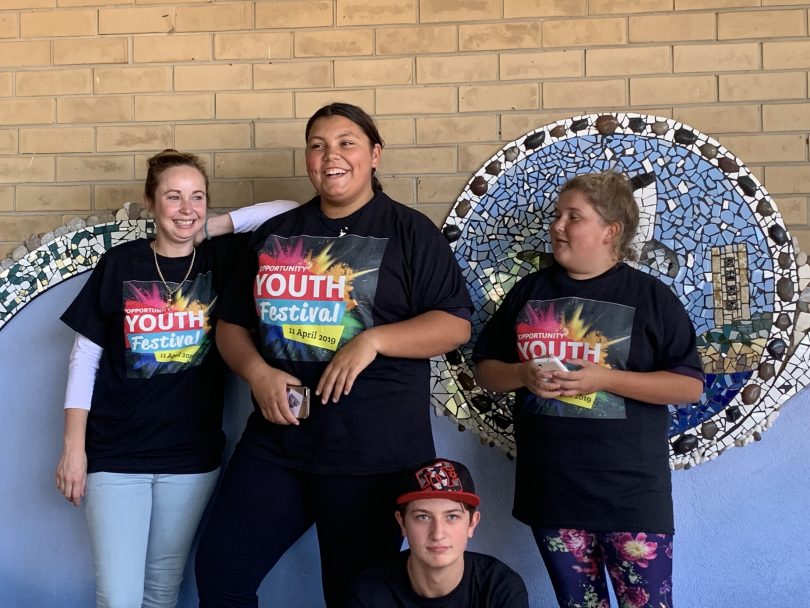
The Eden Game Development Centre in conjunction with the Eden Community Access Centre received a grant for $9,262 through the FRRR ABC Heywire Youth Innovation Grants program. It was to deliver their version of the Heywire Step Up initiative to inspire disengaged young people to take the first step on their journey to success.
William Sharples, who led the development and implementation of the project, drew on his personal experience to inspire and motivate a team of young people to facilitate the ‘Opportunity Youth Festival’, which was held in Eden in April 2019. Like many others in his community, William had tried to seek meaningful and enjoyable work, but living in a rural town, felt his opportunities were limited.
Discovering a passion for video game development and coding, along with the suport of a few key mentors meant William became more engaged. He has followed his dream and now runs the Eden Game Development Centre, teaching young people tech skills like coding, game development and virtual reality.
As a Heywire Trailblazer alumnus, William jumped at the chance to adopt and adapt the Step Up idea to create a fun event, featuring free food and great entertainment, to attract local young people. To ensure it resonated with local youth, he involved young people in the planning and execution of the day.
With so many people and local organisations putting in efforts to create opportunities for local young people, this was a great chance to showcase the opportunities in a fun and engaging manner to attract young people to investigate options available to them.
The theme of the festival was ‘opportunity’ and there was plenty of that to go around. Around 400 youth came from all over Eden and surrounding areas to spend a day showing off their talents, as well as learning about what the future might hold for them.
Weeks of planning by the Youth Project Committee resulted in a spectacular day of fun and frivolity, including local youth bands and singers, displays from 35 services and sporting organisations, and plenty more activities.
Feedback was very positive, with participants and services asking if the event was going to be held again in 2020. In acquitting their report, Eden Community Access Centre said they found their greatest success (and challenge!) was letting youth ‘run the show’, with the Steering Committee merely facilitating their ideas and keeping the event safe and within budget.
Grants of up to $150,000 available for Enhancing Country Health Outcomes
Bendigo, 5 May 2020: The Foundation for Rural and Regional Renewal (FRRR) is inviting not-for-profit organisations to apply for an Enhancing Country Health Outcomes (ECHO) grant to deliver initiatives that improve the health of people living in rural, regional and remote Victoria and New South Wales.
Rural communities face distinct challenges associated with distance and isolation, which place these regions at greater risk of poorer health management and outcomes than those living in metropolitan areas. In addition to these challenges, many parts of NSW and Victoria have been affected by drought, bushfires and now COVID-19, all of which have significant impacts on health care resources.
The ECHO grants program launched in 2018 thanks to a generous donation from Beyond Medical Education. The program offers targeted grants of between $50,000 and $150,000 for charitable initiatives delivered by not-for-profit organisations to strengthen, improve access to, and retain the quality of relevant and appropriate primary health care services in rural, regional and remote Victoria and NSW.
FRRR CEO, Natalie Egleton, says that basic health services, programs and equipment are vital to the sustainability of rural communities.
“Many of Victoria and New South Wales’ rural communities have limited access to appropriate primary health care. This has been compounded by the drought, bushfires, and now by the COVID-19 pandemic, and highlights the real need for communities to be able to attract resources and implement sustainable, best practice models that will see better health outcomes for local residents.
“Last year, we awarded $475,000 in grants through this program, and it’s great to see them making a real difference in the community. For example, Latrobe Community Health Service received a grant of $125,200 to implement the ‘Telkaya Project – Very Brief Advice For Behavioural Change’. Through this project, LCHS developed online training and support materials regarding lifestyle changes around smoking, nutrition, alcohol and physical activity. Staff are now able to integrate this intervention advice into their routine primary health care services.
“Mallacoota Community Health, Infrastructure and Resilience Fund, in Victoria, was another ECHO grant recipient, using $136,864 to help the local medical clinic get additional health services up and running. Patients can now access services including a general mental health program and Teen Clinic and a piloted nurse-led after-hours service, which has been particularly valuable given the impact of the fires,” said Ms Egleton.
Other types of rural and regional focussed projects that could be eligible include innovative primary health care training and leading-edge professional development to address an identified local need; measures to enhance the retention of primary health care services; or fostering local partnerships to develop better primary health care models. Full details and other examples are available in the program guidelines.
“The bushfires and COVID-19 have emphasised the real need for quality primary health services in rural and regional areas. Building strong and sustainable relationships that support the health of these communities is critical. It’s wonderful to be able to provide support for projects on the ground that foster this kind of long-term, health care provider collaboration,” said Ms Egleton.
Applications can be made via FRRR’s Grants Gateway, and close at 5pm AEST, 9 June 2020. Outcomes will be advised mid-August 2020.
Northern Rivers Community Foundation (NRCF) was established in 2004 with the purpose to connect people who care with local causes that matter, to improve community well-being for the Northern Rivers region of NSW. They provide annual grants to a wide range of community groups for projects ranging from mental health, to growing fresh food to ensure children are well nourished and can learn, to distributing Back to School vouchers. NRCF is particularly focused on supporting grand-carers, supporting riding for the disabled and palliative care.
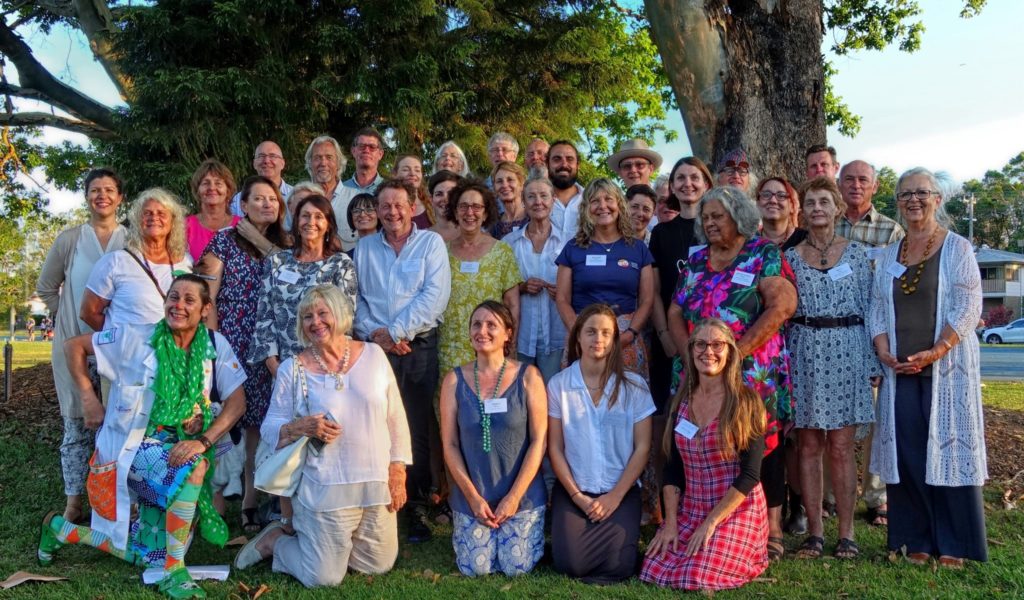
FRRR’s NRCF Community Foundation Account helps facilitate donations for a number of their partners and enables them to leverage FRRR’s tax deductible status to maximise their donations. In 2019 they distributed some $114,000 in grants including to the Bangalow Koalas to set up a wildlife corridor; provided medical equipment to Tweed Palliative Support and Wedgetail Retreat Community Hospice; enabled the Bunjum Aboriginal Corporation to refresh their unit used as a transition house for women fleeing violence; provided professional development for tutors and support workers at Sprung Integrated Dance Theatre; and supported a youth program for first offenders with NSW Police participation.
The Lockhart & District Historical Society operates the Greens Gunyah Museum, the Doris Golder Gallery and the local Visitor Information Centre in the NSW Riverina. They saw a wonderful opportunity for expansion when the building and land next to the museum was listed for sale, under the guise of the Double the Space Double the History Project.
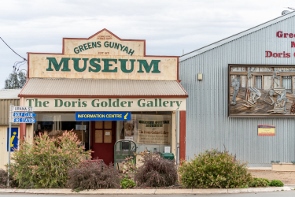
A fundraising campaign, using a FRRR fundraising account and a $15,000 grant from the Culture, Arts, Tourism and Community Heritage (CATCH) grants program allowed the Historical Society to purchase the adjoining property and expand their offerings to include hosting events. New displays could also be developed and storyboards showcasing historical and contemporary stories of agriculture within the region. The Greens Gunyah Museum is participating in a project with ten other museums within the Riverina region to collect video footage of rare and iconic agricultural machines found within the participating museums, and interviews with past operators. Importantly, the collection could be displayed above the flood line and provide an all-weather area in which the collection can be interpreted through a new electronic display, photographs and associated items. Floodwaters up to a metre high had previously come through the museum in 2010 and 2012.
After four long years, and a fundraising campaign which delivered the just under $100,000 required for the project and the revived Greens Gunyah Museum was completed in May 2019. The public is now visiting and able to enjoy exhibitions that have been developed so far.
An exhibition for the politician, diplomat and proud Lockhart local Tim Fischer opened on 2 May 2019 in one of the rooms with an outstanding response from the community. Over 200 people celebrated with Tim, who was able to enjoy his exhibition before he became too ill to attend.
Glen Innes is a small town in the Northern Tablelands of NSW, similar to many other rural farming communities enduring the unrelenting drought. GLENRAC, a local not for profit Landcare network, understands that the farming lifestyle often means that farming families do not have the time to engage in social activities as much as people who live and work in town. On top this, the impact of the drought means that this lack of time is exacerbated hugely, with farmers busy feeding their stock most days, and trying to maintain the rest of their farm in the remaining time.
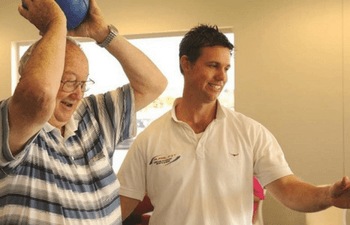
The flow on effect of this is that often farmers in these communities neglect their own physical and mental wellbeing.
“We know that regardless of how well you run your stock, operate your property and manage your business, if your health is compromised, you aren’t able to work to your full ability,” GLENRAC Project Manager Pamela Benton, told the Glen Innes Examiner.
With support from the Tackling Tough Time Together (TTTT) program, GLENRAC partnered with Rural Fit to deliver the Friends with Health Benefits program to Glen Innes farmers, helping to improve their fitness and overall health. The $9,826 grant meant that GLENRAC were able to offer free access to an online group fitness forum and phone calls to Rural Fit for 15 participants over four months.
The program focused on providing:
- Weight loss support;
- Strength training;
- Improving cardiovascular fitness;
- Management and prevention of metabolic conditions – diabetes, cholesterol, and hypertension;
- Management of mental health conditions;
- Stress management;
- Flexibility or joint stability;
- How to reduce injury risk;
- Improving sleep and reducing fatigue;
- Pain / injury management.
The program was officially launched at GLENRAC’s Fit Farmers event in September 2016, which was also R U OK Day. An evaluation at the completion of the program saw that the participating farmers felt better about themselves, were keen to continue to improve their physical fitness, and had developed a new interest in nutrition and made new friends.

